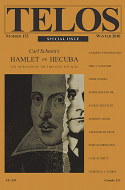 If recent discussions of Schmitt in these pages have made a broad case for the centrality of culture for his thinking, the current issue both specifies and generalizes this approach. The specificity derives from our focus on one key text by Schmitt that is often passed over but is in fact crucial for understanding his work. The generality is a result of the breathtaking sweep of issues that this text opens up for the contributors to this issue: the relation of sovereignty to popular will, the ontological status of modernity, the role of myth in society, the representational structure of human existence, the relation of art and theology to the public sphere. These discussions take our understanding of Schmitt into new directions that draw out not just the aesthetic and cultural aspects of his thought, but also reveal the import of his methods for fundamental questions of epistemology and ontology. He arrives at such questions through the consideration of a single exemplary case: Shakespeare’s Hamlet.
If recent discussions of Schmitt in these pages have made a broad case for the centrality of culture for his thinking, the current issue both specifies and generalizes this approach. The specificity derives from our focus on one key text by Schmitt that is often passed over but is in fact crucial for understanding his work. The generality is a result of the breathtaking sweep of issues that this text opens up for the contributors to this issue: the relation of sovereignty to popular will, the ontological status of modernity, the role of myth in society, the representational structure of human existence, the relation of art and theology to the public sphere. These discussions take our understanding of Schmitt into new directions that draw out not just the aesthetic and cultural aspects of his thought, but also reveal the import of his methods for fundamental questions of epistemology and ontology. He arrives at such questions through the consideration of a single exemplary case: Shakespeare’s Hamlet.
|
|
||||
|
Telos Press Publishing · PO Box 811 · Candor, NY 13743 · Phone: 212-228-6479 Privacy Policy · Data Protection Copyright © 2025 Telos Press Publishing · All Rights Reserved |
||||


